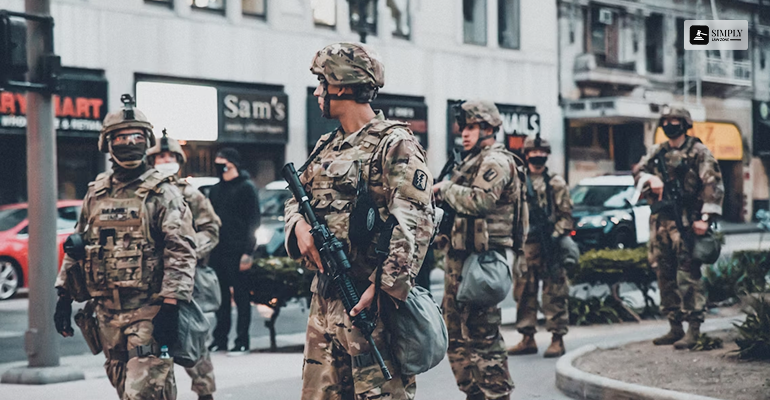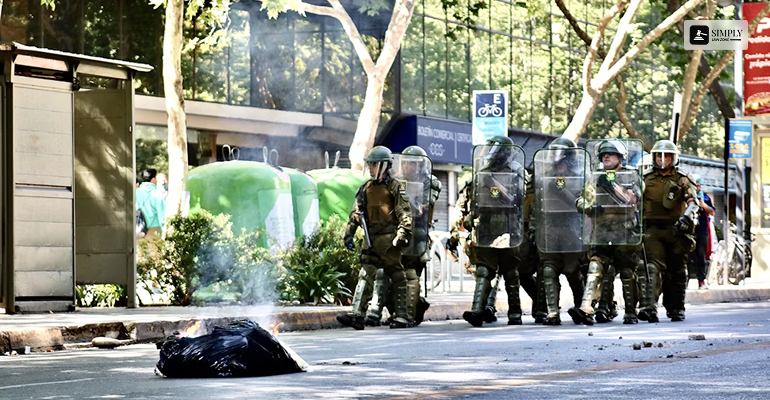
Martial law and emergency preparedness share a symbiotic relationship throughout history. When martial law is declared, the need to be prepared intensifies—whether it’s donning a gas mask to navigate tear gas used by the National Guard, or wearing body armor to protect against armed looters.
If a martial law situation is brought in, the basic rights guaranteed under the Bill of Rights might be put on hold. These include:
- The right to go where one pleases.
- Freedom of speech.
- Protection against illegal searches.
- The right to challenge unlawful detention.
If martial law is on the horizon, the true test of your readiness has arrived. But what to do if martial law is declared? How to ensure that you are prepared? If these are some of the things that you want to know, then keep on reading till the end…
What Is Martial Law?
Martial law refers to the temporary substitution of civilian authorities by military rule in an area facing extreme threats—civil unrest, natural disasters, insurrection, or invasion.
In the U.S., the term lacks a precise legal definition: no federal statute defines it, and Supreme Court precedent remains sparse, inconsistent, and vague.
According to the Brennan Center for Justice, it “usually refers to a power that, in an emergency, allows the military to take the place of the civilian government and exercise jurisdiction over civilians in a particular area.”
History Of Martial Law In The United States
Brennan Center for Justice states that the instances of martial law being declared by federal and state officials have been at least 68 in U.S. history.
As the majority of such cases were local or state-level events, they were mainly officials’ reactions to labor disputes, natural disasters, or civil unrest, according to Military.com.
Some historically significant cases are:
- Battle of New Orleans (1814–1815): General Andrew Jackson commanded the martial law during the War of 1812.
- World War II, Hawaii (1941–1944): After the attack on Pearl Harbor, martial law was enforced that nearly lasted three years.
- Mid-20th century unrest: Civil Rights era and Vietnam War protests—e.g., Montgomery (Freedom Riders, 1961), Isla Vista near UC Santa Barbara (1970)—were areas where martial law was declared in localized zones.
As opposed to numerous myths, martial law was not decreed either in the crisis of Hurricane Katrina or during the 1992 L.A. riots.
The 1960s witnessed the last significant martial law interventions, which, incidentally, were situations where the National Guard was heavily engaged with large-scale threats, but smaller-scale violence and looting still occurred under its distracted watch.
In this case, the civilian’s role is not that of a savior, but of a survivor keeping safe through the ordeal. The periods of martial law can be different, from days or weeks to the exception, like Hawaii during WWII, which lasted almost three years.
Who Can Impose Martial Law?
While the concept of martial law is not explicitly mentioned in the U.S. Constitution, its roots lie in necessity and emergency powers. Here’s the legal landscape:
- State Governors and local officials—such as city mayors and National Guard commanders—have most frequently declared martial law in U.S. history.
- At the federal level, the Insurrection Act of 1807 allows the President to deploy federal troops and federalize the National Guard in cases of insurrection, rebellion, or domestic violence. This overrides the Posse Comitatus restrictions.
- The Supreme Court has never clearly affirmed presidential authority to unilaterally impose martial law, and such declarations remain constitutionally unsettled.
Typically, martial law can be enacted in response to:
- Foreign invasion or attack
- Armed rebellion or insurrection
- Widespread civil unrest
- Natural disasters
- Total breakdown of civil order
Please Note: It’s rare and extreme—but often foreseeable, not spontaneous. Don’t wait until martial law is declared to prepare. Indicators like political unrest, post-election instability, or civil tensions can signal its potential arrival.
What To Do If Martial Law Is Declared?

In case you are in a situation where Martial law is announced, here are a few things that you need to do:
1. Stay informed, act early: Monitor indicators to begin preparing now, not after martial law is declared. These include civil unrest, political instability, emergency alerts.
2. Stock essentials: Times will get tough. So, it is best that you have all the things you need at your disposal. These include:
- Food & water: At least a 2-week supply; longer if possible.
- Medical supplies: First-aid, OTC medications, sanitation essentials.
- Self-defense gear: Depending on legality in your area—gas mask, body armor, personal protection (where lawful).
3. Secure your home: Reinforce entry points, create safe rooms, and ensure you have multiple exit options. Organize backup power sources and communication devices.
4. Plan communication: Designate contacts and procedures in case networks fail. Analog backups like radios can be vital.
5. Mental & community readiness: Strong mental resilience, plus alliances with trusted neighbors or family units, can provide critical support during prolonged uncertainty.
6. Know your rights—but avoid confrontation: Even under martial law, the Constitution continues to exist. But in many cases it’s suspended de facto. Stay non-confrontational; your priority is survival and stability, not legal battles mirroring chaos.
Martial law is an infrequent occurrence. However, it’s a chance. Even though such events as local unrest, election aftermath, or extreme emergencies highlight the need for readiness beforehand.
Please keep in mind that you are not responsible for rescuing the entire system rather, for protecting your safety, honor, and community continuity when the system fails.


